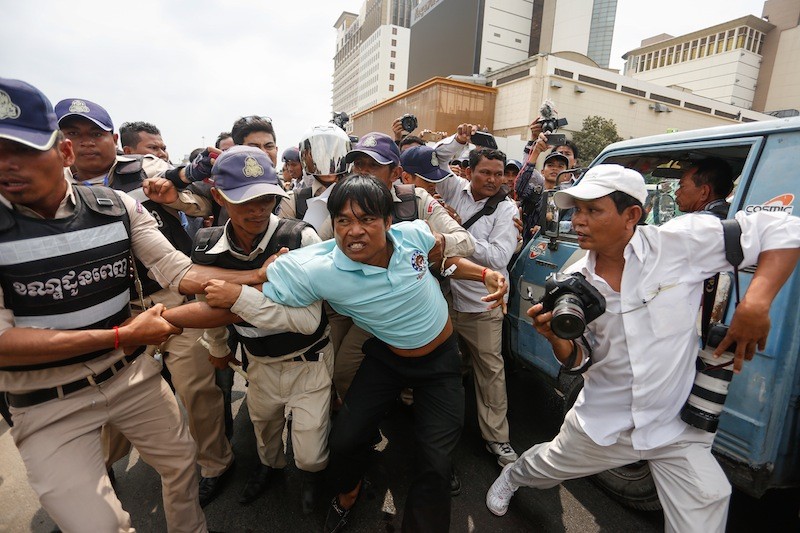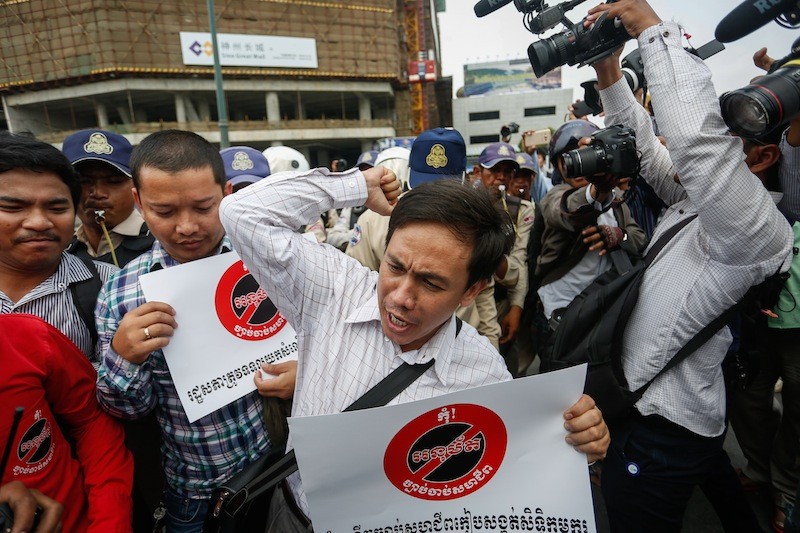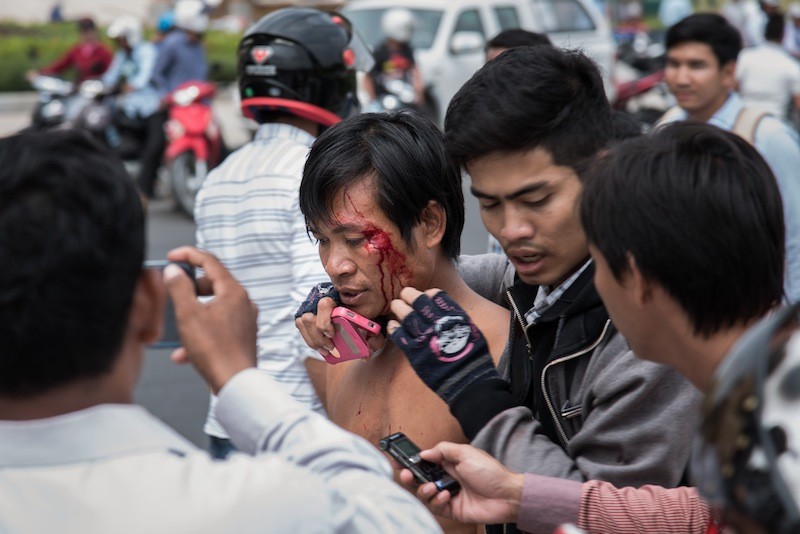CPP lawmakers unilaterally passed a controversial trade union law on Monday despite protests by unions, alarm among employers and warnings from the International Labor Organization (ILO) that the bill may violate domestic law and labor conventions signed by Cambodia.
During protests against the law outside the National Assembly in the morning, state security guards punched a unionist in the face and threw a labor leader to the ground amid shouting matches.

In debate on Monday afternoon, ruling party lawmakers defended the law against complaints by the opposition CNRP, whose lawmakers trickled out of the Assembly throughout the day and ultimately voted against the bill.
CPP lawmaker Pen Panha, who heads the parliamentary committee on legislation and justice, noted that the law, which sets new rules for establishing, operating and shutting down a union, had been seven years in the works.
“[T]his draft law has received a lot of input from all concerned stakeholders, especially unions, employers and the ILO, and the law responds to all requests of every stakeholder,” he said.
However, most of those involved in the drafting process continued to speak out against the law until its passage, with unions staging an eleventh-hour demonstration that was met by violence.
At about 10 a.m., Daun Penh district security guards moved in to clear out dozens of unionists and activists who had gathered near the National Assembly to air their grievances about the law.
The guards were pulling Suot Chet, an official for the Collective Movement of Union of Workers, away from the Assembly when one of them, wearing a white motorbike helmet with a visor covering his face, punched the unionist next to his right eye, drawing blood.
“I did not talk to them, I was just walking away and he came to beat me,” Mr. Chet said after the incident.
Yaing Sophorn, a prominent union leader in the garment sector, was engaged in a shouting match with the guards when their chief, Kim Vutha, grabbed her by the arm and threw her to the ground, apparently in response to her saying, “Don’t touch me.”
After getting to her feet, Ms. Sophorn said the behavior of the guards was symbolic of the government’s attitude toward workers.
“We just held a peaceful protest and did not cause any traffic jam, so why have you committed violence toward us?” she asked. “This reflects the government of Cambodia not protecting our workers properly.”

Mr. Vutha and Daun Penh district governor Kuoch Chamroeun declined to comment on the violence on Monday. City Hall spokesman Long Dimanche said the municipality had yet to review video of the incident, but suggested that the unionists were in the wrong.
“They were protesting without asking permission from authorities,” he said.
Making a final, futile call to delay the bill in the afternoon, opposition lawmaker Son Chhay told parliament that several problematic elements of the law remained unchanged from earlier drafts.
In particular, Mr. Chhay said the law failed to include provisions that would prevent union leaders from working for employers or the government, or establish independent labor courts that would operate separately from the existing court system.
Labor Minister Ith Sam Heng said that a labor court would be established by 2017.
The ILO sent comments to the government as recently as last month outlining articles that risked violating the government’s commitments to protecting workers’ rights. Among those were provisions that could be used to bar individuals from running a union if they had any past criminal convictions.
In a statement released after the law was passed on Monday, the ILO said the organization’s supervisory committees would weigh in on the legality of the version of the law that was passed.

Moeun Tola, who heads the labor rights group Central, said the ILO’s seal of approval was crucial to the garment sector, which employs some 700,000 workers, mostly young women.
“The draft law is definitely unconstitutional and against the conventions. So when the law violates the Constitution and conventions, it will impact the international brands as well,” he said.
“Because the brands, when they talk to consumers in the U.S. or E.U., they say Cambodia has good laws. But when there is the law that violates the Constitution, that will undermine the trust they have with consumers.”
Mr. Tola said union leaders would meet to discuss how to organize as the law moves to the Senate and eventually to King Norodom Sihamoni, both of which are expected to approve it.
Ken Loo, secretary-general of the Garment Manufacturers Association in Cambodia, said that after months of speaking out against provisions in the law, employers would now turn their attention to how it is implemented.
“Of course we will no longer ask for the government to consider amending the law, because it was passed,” he said, adding that concerns remained over the low threshold for the number of workers needed to form a union, which the law sets at 10.
“That is an issue, but if the government is serious about other articles of the law, that would help,” he said. “For unions that respect the law, we will not have as many issues as we do today, it’s just that all the unions were able to operate with impunity.”
(Additional reporting by Colin Meyn)




